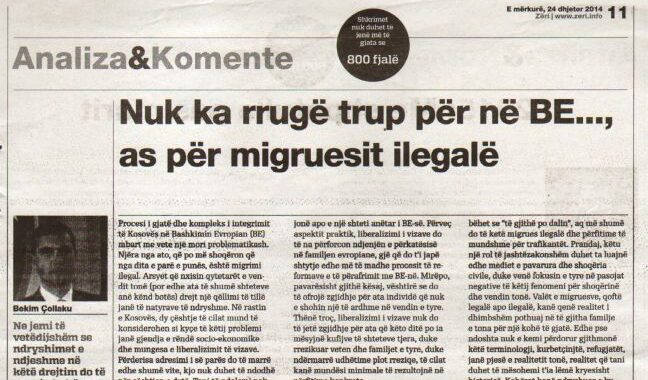The long and complex process of Kosovo`s integration in the European Union (EU) carries with it a range of issues. One of them, which is accompanying me since the first day of work, is illegal migration. Reasons that encourage the citizens of our country (and those of many countries world-wide) towards such a goal are of different nature.
In the case of Kosovo, the two issues which can be considered as the key issues to this problem are the severe socio-economic situation and lack of visa liberalization. Whereas addressing the first one will take many years, this should not be the case with the second issue.
Now, let’s stop and analyze the second issue. Facing this problem, I noticed that it has been created an accepted narrative, which is wrong in essence, that illegal migration is happening due to the lack of visas for the citizens of Kosovo who want to travel to different EU countries.
The other part of this narration usually continues with the statement that upon visa liberalization (in unexplainable manner) illegal migration will not pose a problem anymore. One such narrated misconception often echoed in the writings and various articles published on this topic. Therefore, we consider that it is very important to initially agree that this problem exists, and secondly we need to better understand it, throwing down some wrong prejudices.
First, the visa regime is not one of the factors that are directly causing irregular migration. Perhaps, this widespread confusion has fed the wrong idea on what visa liberalization will bring. Visa liberalization has its own limits.
The visa waiving will enable citizens, who meet the necessary conditions, to travel for short visits to EU countries either for tourism, family visits or meetings in a professional context etc. This would initially bring to an end the lengthy administrative procedures for short trips for citizens that have met the conditions and did not have any problems to obtain visas.
Even after liberalization, there will be persons who will not be able to travel to EU (those who are involved in any illegal activity), so any suspected person can be stopped by either our border police or the EU Member State police. In addition to the practical aspect, visa liberalization will reinforce our sense of belonging to the European family, which will give greater impetus to the reform process and harmonization with the EU.
However, despite all this, it will hardly provide solutions for those individuals who do not see a future in their country. Frankly, visa liberalization will not be the solution for those who these days yearn for the boundaries of other states, endangering themselves and their families, taking trips full of risks, which have minimal opportunities to result in tangible benefits.
This brings us to the second wrong premise, that visa liberalisation will automatically stop illegal migrants. If we rely on the experience of other Balkan countries, which have been given the opportunity of visa-free travelling, the numbers of asylum seekers in some cases increased after visa liberalisation. This is a known fact and for this reason the EU member states have continued to tighten the conditions and to increase the requirements in this process.
Thus, in addition to the conditions set out in the Roadmap of the European Commission, they now are giving added importance to performance indicators, respectively to figures of illegal migrants and asylum seekers. There is a connection between the issue of ilegal migration and the visa liberalisation process, but not as it is usually presented.
Their only connection is that illegal migrants can have a negative impact on the visa liberalization process, because illegal migration serves to EU member states as a measuring mechanism of the danger that can be posed by eventual liberalization. This means that the higher the number of illegal migrants, the slower will be the process of visa liberalisation.
Another a prejudice that is often repeated is that supposedly, this is a new problem for Kosovo. The novelty probably lies in the fact that this ongoing problem of ours now has a direct impact on our visa liberalization perspective and that it can be used for political gain. However, the truth is that such a thing suits only the traffickers and organized criminals which are orchestrating this process. The traffickers are the ones who are bennefiting from all the commotion that “everyone in leaving”, as they will have more illegal migrants and more potential gain.
Hence, there is a tremendous role that should be played by the independent media and the civil society, by focusing in the negative consequences of this phenomenon for our society and our country. Waves of migrants, both legal and illegal, have been a painful reality in almost all our families for a long time.
Although we may not have always used this terminology, the migrants, refugees, are part of our reality, a reality that we now must learn to leave it to the history. Times have changed, and this change is noticeable to Europe and to the World – they do not accept asylum seekers from Kosovo because they know that Kosovars are not persecuted and oppressed as before. Anyone who uses this as an excuse (and there are many, unfortunately) does not honor himself and does in fact misuse our painful history.
Either way, we need to provide different solutions in order to significantly and quickly appease this phenomenon. The Government of the Republic of Kosovo should urgently take specific actions on the following days and weeks to add activities in order to combat this doubled evil for Kosovo.
I consider it a „doubled evil“ because on the one hand is directly hurting citizens and on the other hand is damaging the visa liberalization process. Illegal migration is not an easy problem. Rather, it is a complex problem that is fed by numerous factors, both internal and external, that are not and cannot be in our hands.
In our case, dominant reasons are related to the need and dreams for a better life. We are aware that significant changes in this direction will take time, but we should do them together. However, something that we can do in the short term is „not to throw gasoline to the fire“, and unite the efforts to decrease the flow of „escapes“ from our country. This would be the best service that we could do for the citizens and our country in addressing this problem.
The author is the Minister of European Integration in the Government of Kosova. This article is written specifically for the newspaper “Zëri”)
Last modified: August 12, 2022











… [Trackback]
[…] Read More on to that Topic: integrimievropian.rks-gov.net/en/there-is-no-shortcut-to-eu-nor-for-illegal-migrants/ […]
… [Trackback]
[…] Read More on that Topic: integrimievropian.rks-gov.net/en/there-is-no-shortcut-to-eu-nor-for-illegal-migrants/ […]
… [Trackback]
[…] Read More on to that Topic: integrimievropian.rks-gov.net/en/there-is-no-shortcut-to-eu-nor-for-illegal-migrants/ […]
… [Trackback]
[…] Read More Information here on that Topic: integrimievropian.rks-gov.net/en/there-is-no-shortcut-to-eu-nor-for-illegal-migrants/ […]